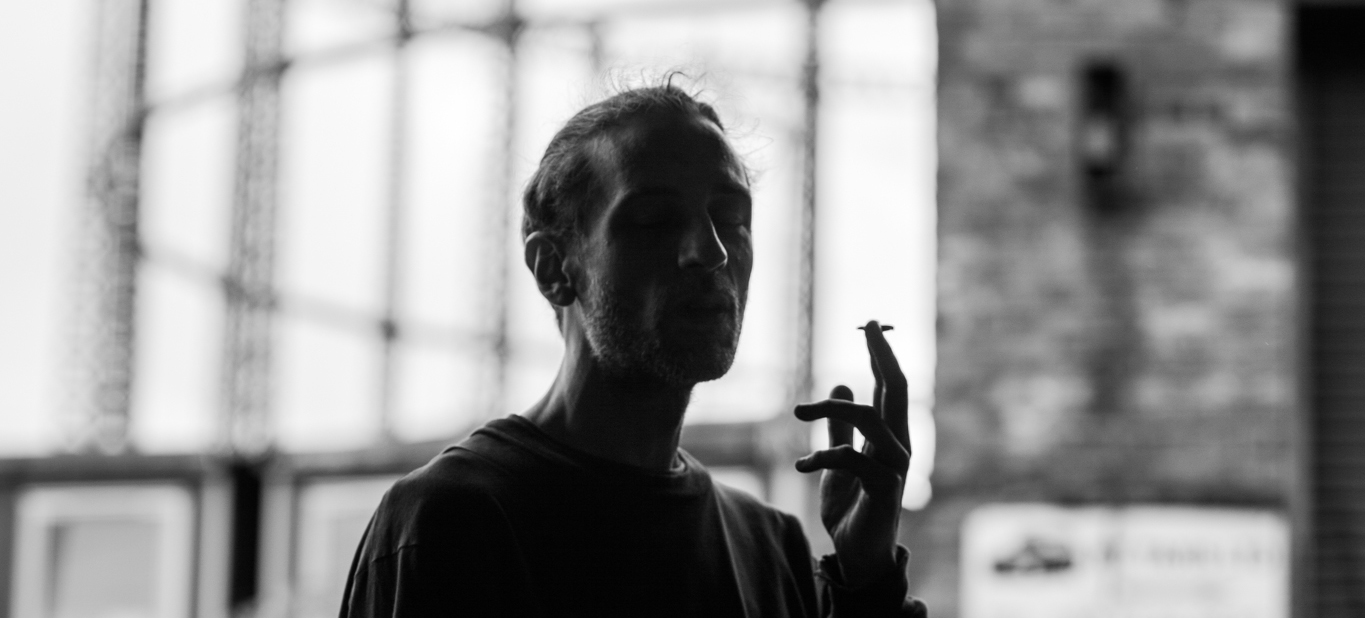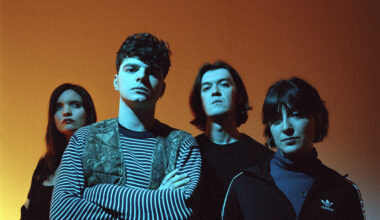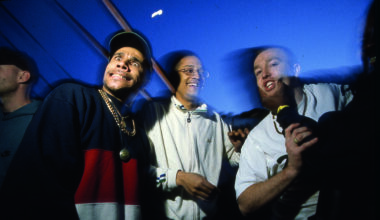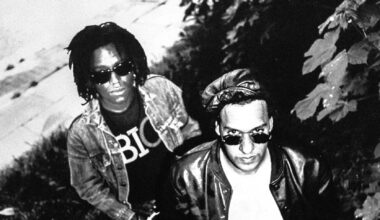Luke Vibert has reanimated his Amen Andrews jungle alias for one of a trio of essential future-retro releases this summer. Join us for stories galore, including the one about how Aphex Twin helped him pay his tax bill
If you were to make a list of adjectives that come to mind when the name Luke Vibert is mentioned, it would be a very long time before you thought of the word “lazy”.
Ever since the Cornishman emerged as Wagon Christ with ‘Phat Lab Nightmare’ in 1994, he’s been one of electronic music’s most prolific producers. He’s recorded albums for pretty much every legendary British electronica label, from Rephlex and Warp to Planet Mu, Mo’ Wax and Ninja Tune.
This summer, after the sizzling acid delights of last year’s ‘Valvable’ album for the I Love Acid imprint, Vibert is releasing not one but three long players in rapid succession on Hypercolour Records. ‘Amen Andrews’, a reference to his sometime jungle alter ego, dropped in May, followed by ‘Modern Rave’ in June. ‘Rave Hop’ is scheduled to complete the series at the end of July.
While each album has its own theme, showcasing a different side to his multi-faceted talent, they are all stamped with the same unique Vibert character. Whether they’re 90, 120 or 170 bpm, or indeed anywhere in between, there’s something distinct in his technique – a swing to the beats, a sunny optimism to the melodies, a love of old skool samples, and a certain cheekiness that seems to ooze out of the grooves.
Yet despite all that, when I catch up with Vibert in the garden of his south London home on a sunny Sunday afternoon (social distancing observed), what’s the word he uses to describe himself?
“I’m so lazy,” he declares.
I point out that “productivity” is one of the themes I was intending to discuss with him.
“Oh, not about making music, obviously,” he replies. “Just everything else in life.”
When I ask if he has the vaguest notion of how much music he’s released over the years, he gives a shrug.
“I haven’t got the faintest idea, if I’m honest. I couldn’t even tell you how many albums I’ve made.”
Well, his Wikipedia page catalogues no less than 27 and this summer’s releases will make a total of 30. That’s an average of well over one a year. No wonder he’s not had a lot of time for reflection.
It has been a turbulent few years for Luke Vibert. It started when he was priced out of Hackney in 2009 after a long period spent living opposite Hackney Central station. As a result, he and his partner moved their family home to the outskirts of south London.
“That turned out to be a stroke of good luck,” he says. “The area we moved to had escaped the developers’ attention at the time. Hackney is unrecognisable from when we lived there, but it’s happened all over London. Look at Elephant and Castle, where Aphex was living. It’s all huge skyscrapers now.”
Unfortunately, Vibert neglected to tell the Inland Revenue about his new location following his move. Having subsequently missed several years of tax returns, he was suddenly lumbered with an eye-watering tax bill. He’s still trying to pay it off.
“Sadly, it’s not like the old days when Virgin would give you £90,000 just to get you out of the deal you were in,” he says.
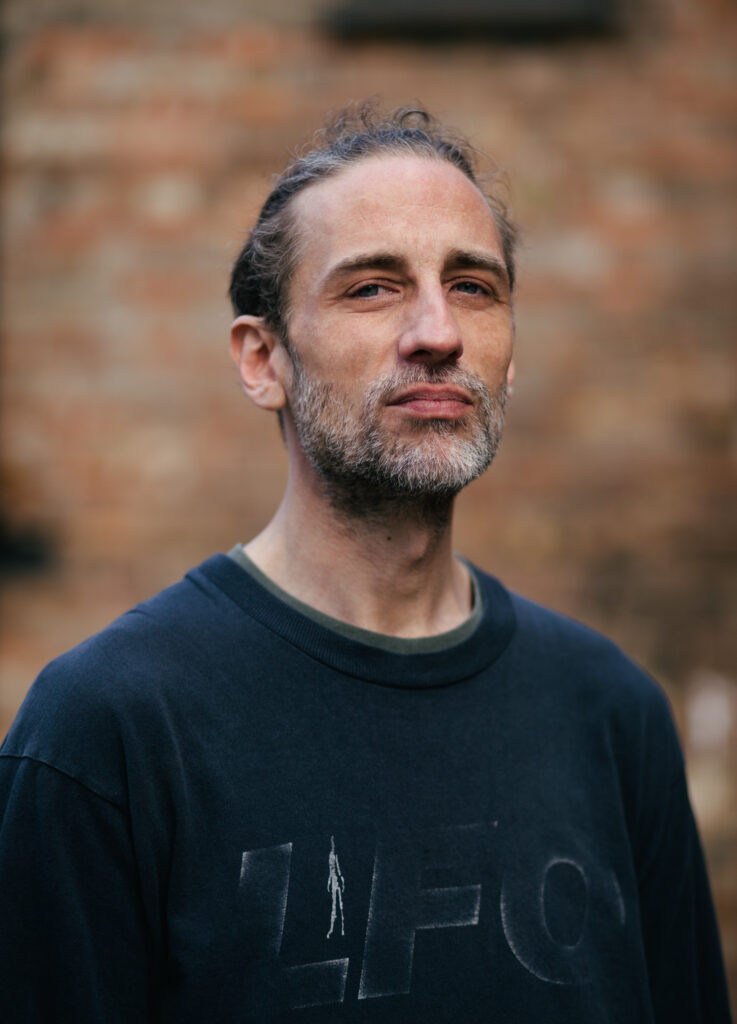
An initial plan to sell his collection of breakbeats online was quickly aborted.
“That was a disaster,” he laughs. “Of course, a lot of the breakbeats were nicked from other records. I got a lot of emails and comments saying, ‘I hope you’re going to pay the drummer who played that!’. So I took them down in the end.”
But at least long-time friend and sometime collaborator Aphex Twin was happy to give him a helping hand.
“I had a couple of really valuable Aphex singles, so I contacted Richard to check it was OK for me to sell them. He was fine with it. In fact, he said, ‘If you need money, you can have this cassette’.”
The tape was Aphex Twin’s personal recording of his live set at the Fuji Rock Festival in 2017. Reputed to be worth a five-figure sum, it made a considerable dent in the tax debt. How is the enigmatic Twin these days?
“Oh, he’s fine,” says Vibert. “Although I’ve not heard any new music from him for a while.”
Lockdown has not been easy for Vibert either. His partner and teenage children have been holed up in Marseille, where they normally spend part of the year, so he has been home alone in London since late March. He has also been dealing with the death of his father, who passed away just before Covid-19 hit. His dad was immortalised in the title of arguably Vibert’s most famous and celebrated album, ‘Drum ‘N’ Bass For Papa’, released under the name Plug. Sorting out the estate has necessitated a couple of lockdown-breaking trips down to his native Falmouth to sift through his father’s house.
“He was a crazy, dirty hoarder!” he laughs. “There are a lot of amazing things there, some incredible paintings, but it’s been a bit of a nightmare sorting it all out.”
In typically candid fashion, however, Vibert admits that there is an upside to his current isolation. He says he’s returned to the single-minded devotion to the creative process that he had in his early days, an approach that family life can sometimes get in the way of.
“It sounds awful, doesn’t it?” he says. “I do miss them, but I also miss the time when you’d work for eight days flat out and leave the equipment on all the way through, because otherwise you’d lose everything.”
The way Vibert tells it, making music is not just a way of life, it’s almost an addiction.
“I turn into an arsehole if I don’t do it,” he reveals. “I start getting really misanthropic. People who know me have to tell me to get back to it, because I get really short with them. Thank God I discovered weed and music. They’ve saved me, otherwise I’d be fighting people. My dad was quite a fighty character and I didn’t want to end up like that.”
This is a glimpse into a side to Vibert that isn’t immediately obvious, either from the effortlessly playful nature of much of his output or from the usually bubbly personality he projects behind the decks and in interviews. But then he’s always been extremely open, to say the least. He once readily admitted that he used to take tracks to Mo’ Wax boss James Lavelle for consultations, listen to Lavelle’s suggestions, and then bring back the identical recordings a month later, usually resulting in enthusiastic approval.
“Oh yes, I will say absolutely anything,” he laughs, as I ask him about his foot-in-mouth episodes. “Was it one of the interviews I did with you, where we were talking about people who just put a DAT on when they’re playing live, and I said The Chemical Brothers were cunts? That ended up being the headline of the article – ‘The Chemical Brothers Are Cunts!’. It was a little awkward when I was signed to Virgin and I bumped into them. They were a bit off with me!”
Turning back the clock, I want to probe at the roots of Vibert’s key musical tastes, because ‘Amen Andrews’, ‘Modern Rave’ and ‘Rave Hop’ each has a very defined genre of its own. There’s also the fact that the raw materials he tends to work with, albeit refashioned in his own vision and image, are often from the recognisably classic beginnings of those genres. Is there an element of nostalgia going on here?
“I suppose so,” he says, as if the thought had never crossed his mind. “You could call it futuristic retro maybe. A lot of the samples I use just happen by chance, though. I’ll scroll through loads of sounds until I find one that fits.”
Hip hop was the first music that Vibert fell for. He remembers ‘The Message’ by Grandmaster Flash And The Furious Five having a major impact on his younger self.
“My dad bought that. He’d put it on and do this incredible Rod Stewart-style dancing to it.”
Then, when he was about 10, a family friend moved to the nearby town of Redruth, bringing the ‘Street Sounds’ electro compilations with him.
“That was when I stopped listening to Madness and Adam Ant and started listening to John Peel,” notes Vibert. “He played hip hop, but also punk and African music and whatever else he felt like.”
Rave music edged onto his radar a little later.
“Around 1988, I was really into the Pixies and Dinosaur Jr. I still loved hip hop, but I’d kind of pushed it to the back of my brain. I never shook off Prince though, he’s always been my number one. Anyway, my sister started working in this club called Victor Dragos and she got me a job there too. I was only 16 and my job was to guard the back door, stopping people from nicking the booze from the stock room. That place was the first time I heard rave. At first, it was just so loud it didn’t even register as music in my brain. But by week three, I would recognise something I’d heard before and I began to like it. By week six, I’d dropped the Pixies completely.”
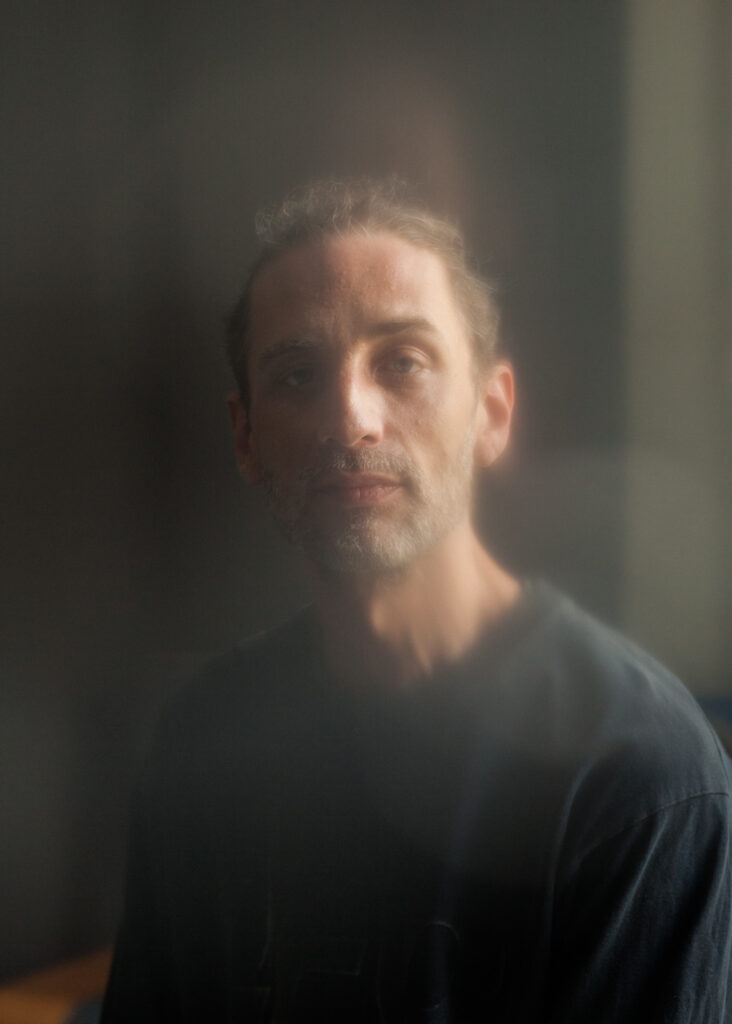
The first rave tunes he remembers cottoning on to were those that mixed hip hop breaks with electronics.
“I think ‘Mr Kirk’s Nightmare’ by 4 Hero might have been the first,” he says. “Or possibly something by Silvah Bullet. Hip hop was faster then and there was a lot more crossover than there is now. Everything was just this big crazy mixture.”
Vibert moved to London in 1994 and started getting into jungle soon afterwards. By this point, he’d been DJing around Cornwall and Devon, graduating from rave to Detroit techno and “sexy garage” because he was “bored of the whole white gloves and whistles crowd”. To begin with, he was enraptured by the snapping snares and jerky beats he heard bursting forth from cars around east London. Then he heard the same beats on pirate radio and started to investigate.
“It was quite a revelation,” he grins. “I’d written off that darker side of rave music. A lot of people I knew, people like Grant Wilson-Claridge [co-owner of Rephlex Records with Aphex Twin], would say, ‘What are you listening to that for? It’s fucking shit’. They were still into the Detroit thing. They didn’t really like anything with samples in at that time.”
It was the most frantic, extreme jungle that initially appealed to him, but he came to appreciate the smoother end of the genre through his partner.
“We met around 1997 and she got me into stuff like LTJ Bukem, with those lovely pads and that amazing production. Kids will be listening to Bukem in 50 years and trying to figure out how he did it.”
As for his productions, Vibert says he’s pared his collection of gear down to two different set-ups, mainly because some of the ageing equipment in his studio has stopped working. As is probably evident to most ears, last year’s ‘Valvable’ album features live improvisations created on a spartan set-up consisting of a 303, an 808, and a Roland JX-3P polyphonic synthesiser.
“I’d only done EPs for I Love Acid before ‘Valvable,” he says. “Their releases all have this fantastic artwork and hand-bordering on the sleeves, which is something I really appreciate. For the album, I gave them around 100 tracks and let them choose. I just suggested a couple of things that might go with other stuff at the very end.”
His three 2020 albums were meanwhile all created on his second set-up, which is similarly simple. It’s basically a computer running the production software package, Reason.
“People have asked me, ‘Why are you using that? It’s like a toy for kids to play with’, but it’s always worked for me.”
The secret to his success, he reckons, is the massive archive of sounds of every description that he’s built up over the years.
“When I signed to Virgin, I decided to treat myself to some serious hard disc storage,” he recalls, admitting that the audio capability went to his head slightly when it came to recording his Mo’ Wax album ‘Big Soup’. “When I listen back to that record, I’m shocked by how many samples I used. There’s a whole orchestra of samples going on there.”
Despite the range of audio possibilities when working on a computer, the vibe on Luke Vibert’s three new albums isn’t over the top. It’s the sound of a producer knocking around motifs and having fun without being tempted to over-egg anything. Of the trio of releases, it’s the low-tempo ‘Rave Hop’ that crosses into relatively new territory. Vibert combines his trademark swinging hip hop beats with more gnarly rave elements, rather than the softer ambient tones we’ve come to expect.
The beginnings of ‘Rave Hop’ lie in a prank that Vibert and his mates played on a friend with a rather over-enthusiastic penchant for ketamine more than a decade ago. After an evening when the drug-addled pal insisted that a certain rave track was sounding slow when it was, in fact, at normal speed, Vibert set about recreating the piece at the vastly more pedestrian 90-100 bpm. He then sneaked this new version into a mix when they all got together again.
“Our friend was going, ‘Come on, this really is slow now’, but we were all pretending it sounded normal to us. I gave the track to Aphex and he opened his set with it somewhere. People were going mad when they heard it. I also did a remix for Jamie Lidell [‘A Little Bit More’, released on Warp in 2005] in the same style and then I kept making tracks in a similar vein. In the end, there was an album’s worth.”
Humour is a key element that runs through all of Vibert’s productions, whatever the speed and whatever the style. One of his early singles, ‘Nervous Breakdown’ on Rising High, featured a prominent sample of comedian Peter Cook. In past interviews, Vibert has said he seriously considered a career in stand-up comedy before music called him as a vocation.
“Oh, I like all sorts of comedy,” he says as we begin to wrap up. “I’ve been watching the whole of ‘Peep Show’ again in lockdown, but my favourite comedian is Chris Morris. We saw him in Marseille when we were queuing up for a boat or something, and I was shouting ‘Chris, Chris’ to get his attention. I think I rather freaked him out, as he sort of jumped and looked surprised. I said, ‘Thanks for all the great stuff, Chris’. And then we were all in the same queue for another 45 minutes, so it was a little bit awkward!”
It’s an amusing image, for sure. The impenetrable, Paxman-esque confidence of Morris caught off-guard and ambushed, in the nicest possible way obviously. But as those of us who have been following Vibert’s antics for the past quarter of a century can tell you, he likes to have a surprise or two up his sleeve, nowhere more so than when he’s performing live. When we’ll see him back in action, of course, is anybody’s guess. He did manage to make an appearance – well, three in the end – at the Bang Face weekender at Southport just as the Covid-19 emergency broke.
“It felt like the last rave on Earth,” he says.
But rest assured, he will be back.
“I keep thinking of that line at the end of ‘Clouds Across The Moon’ by The RAH Band,” he adds as we sign off. “You know, ‘I’ll try again next year’.”
Make sure you do, sir. Make sure you do.
‘Amen Andrews’, ‘Modern Rave’ and ‘Rave Hop’ are on Hypercolour
